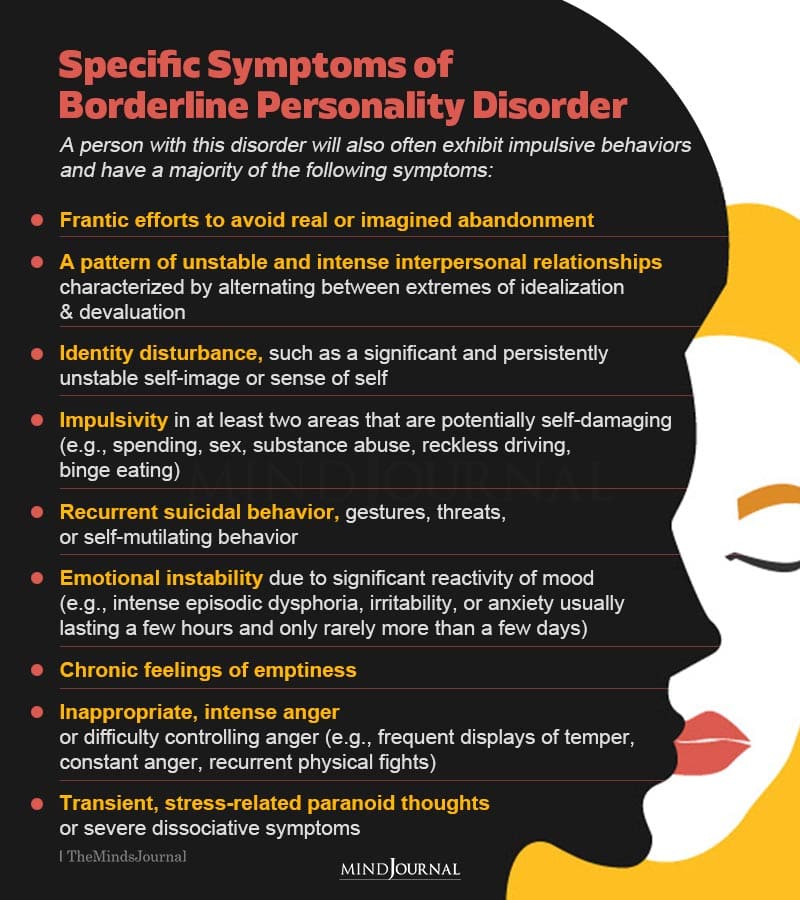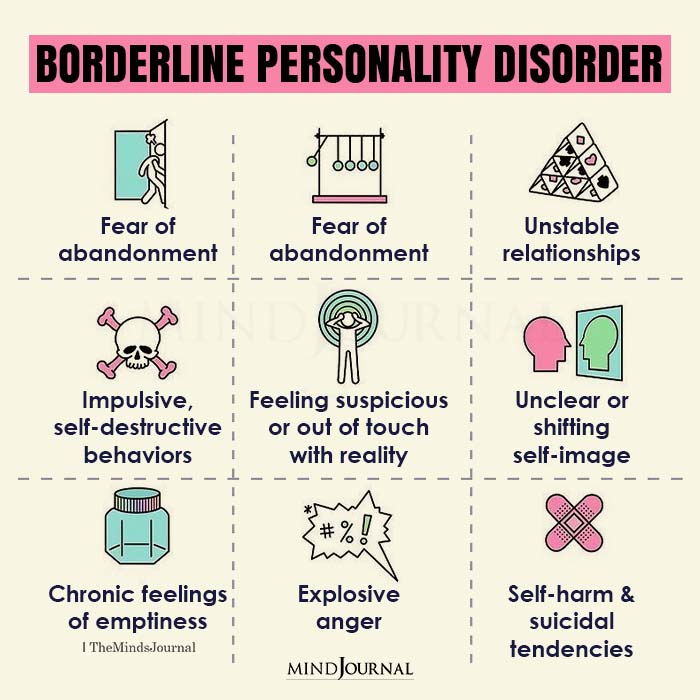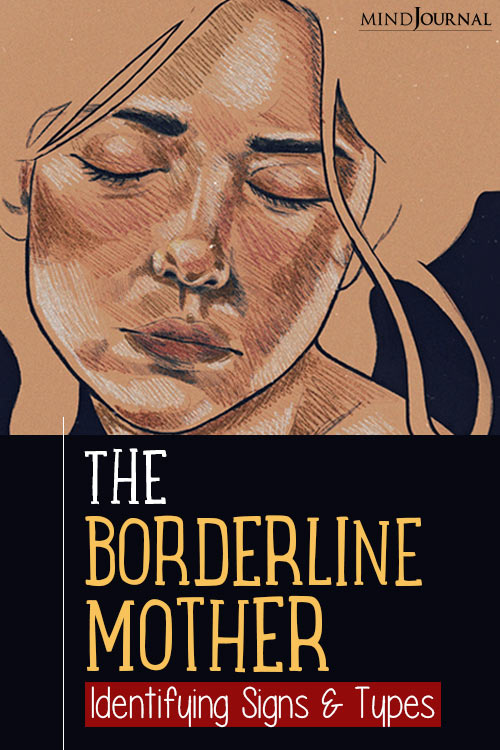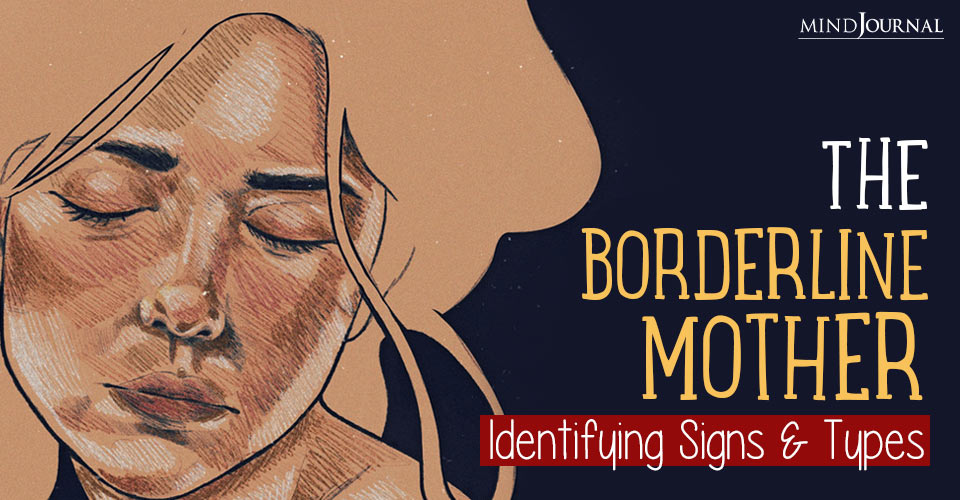Children who have grown up with borderline mothers know how hard it is to live with them and try and maintain a relationship with them. Understanding the borderline mother needs a lot of patience, but at the same time, it can be emotionally and psychologically exhausting too. However, you shouldn’t feel guilty about feeling like this, because a borderline mother can be a lot, like really a lot.
When you are raised by a BPD mother, more often than not your childhood is characterized by fear, anguish, anxiety, and trauma. From a very young age, you learn to tread on eggshells because you never know what might trigger her or set her off. You never knew how she would react, which is why you were in a constant state of hypervigilance and apprehension.
Before we dive deep into the types of borderline mothers and the symptoms of borderline mother, we need to understand what is a borderline mother, and how they function.
Related: 4 Types Of Borderline Personality Disorder
Understanding The Borderline Mother
If you have a mother who is controlling, lacks empathy, and is emotionally very volatile and unpredictable, then chances are you have a borderline mother. Borderline Personality Disorder (BPD) is a kind of mental illness that affects a person’s behavior, thought process, and emotions.
Understanding the borderline mother requires you to understand how BPD works. People suffering from BPD (including your mother) tend to struggle with their mood, relationships, self-image, self-worth, and impulsivity.
Borderline mothers often have thoughts of suicide and self-harm, have trouble regulating their emotions, especially the negative ones, and suffer from a chronic sense of emptiness and unhappiness.

Identifying Signs Of A Borderline Mother
These are the borderline mother traits you should look out for if you suspect your mother to be one:
- She always has a negative attitude towards everything
- She is highly emotionally unpredictable
- Excessively critical of others, especially her children
- Withholds affection, love, and support due to a lack of empathy
- Overly controlling, especially of her children
- Argumentative, short-tempered, and hostile
- Never validates and supports her children
- She is extremely selfish and self-absorbed and always puts her own needs first
- Excessive involvement in her child’s life, or not involved at all
- Constantly thinking that her children are going to abandon her
- Walking around on eggshells around her
- Constantly complaining about every little thing
- Shows tendencies of carelessness and recklessness
- Her children are more of a mother to her than the other way round
- She has intense and dangerous anger outbursts
- Overly dramatic and attention-seeking
- Self-absorbed and quite narcissistic at times
Related: Understanding Borderline Personality Disorder (BPD)
4 Types Of Borderline Mothers
American psychologist, James F. Masterson believed that there are 4 BPD mother types, and they are as the following:
1. The Witch Mother
This type of borderline mother is extremely toxic and full of self-hatred. She is always cruel to her children and always treats them with hostility and hatred, and the sad thing is she doesn’t even realize the damage she is causing. Self-obsession is her middle name, which makes her extremely critical of you. On top of that, her opinions and criticisms are always cruel and poisonous.
All she wants to do is control you and treat you like her puppet, and if you don’t listen to her and do exactly as she says, then she will rain hell down on you. Behind this unhealthy and obsessive need for control lies her fear of abandonment; she is petrified that she will be abandoned by you.
She doesn’t do well with rejection or criticism and can violently lash out if subjected to that. Additionally, she also has a tendency of being overly cruel towards people less powerful than her, mostly her younger children. Witch mothers are the most resistant to treatment since they are convinced that nothing is wrong with them.
2. The Hermit Mother
The hermit mother has a very poor self-image and self-worth and suffers from immense shame, which she then projects on the people around her. She always portrays herself to be extremely strong, confident, and self-assured but that’s only a facade. On the inside, she feels scared, worthless, insecure, paranoid, and distrustful.
She is overly pessimistic and anxious and always expects something or the other to go wrong. This type of borderline mother is always on edge, and even when everything is okay, she will find something to be scared of. She sees the world as a dangerous place and everyone as selfish, self-serving, cruel, and irresponsible.
Hermit mothers will always try to control their children because of this intense fear. They will curb their freedom in the name of parental protection and will prevent their children from being independent. The ideal scenario for her is to confine her children inside the house with her, forever.
3. The Waif Mother
The waif mother is best characterized by hopelessness, victim-mentality, helplessness, extremely low confidence, vulnerability, and excessively high sensitivity and passivity. She thinks she is a failure, and a waste of space; she is convinced that nobody loves her and that she’s a burden on everyone.
Waif mothers are quite unpredictable, as in, they will sometimes completely ignore their children and neglect them or they will pamper and indulge them to no end. It’s either this or that, and there’s no middle ground. Her victim mentality leads her to always complain about everything, and make everything about her.
She has a lot of rage and anger within her, which comes out during stressful and high-conflict situations. One moment she is crying, and the very next moment, she might fly into a rage and start screaming, shouting, and breaking things. Again, a fear of abandonment might be the reason behind this.
Related: Difference Between Borderline Personality Disorder and Narcissistic Personality Disorder
4. The Queen Mother
The Queen Mother is probably one of the worst types of borderline mothers out there. Understanding the borderline mother is one thing, but trying to understand someone as toxic as her is a different ballgame altogether. Queen mothers are extremely narcissistic and cannot tolerate their children doing something she doesn’t want them to do. Extremely dominating and entitled, according to her, only she gets to decide how her children will live their lives.
She is always looking for attention, and cannot bear it if she is not in the limelight. She projects and imposes her own desires on her children, uses them to fulfill her unmet dreams and aspirations, emotionally manipulates and blackmails them when she doesn’t get her way, suffers from a perpetual sense of emptiness, and cannot stand it if her children disagree with her on something.
Mothers like this also tend to be very interfering and intrusive when it comes to their children’s lives. They will snoop around your personal stuff, read your journals, go through your clothes, check your phone, and might even flirt with your partner. If you don’t behave the way she wants you to, she will guilt, humiliate, devalue, and shame you into doing what she wants.
She might even use you as her accessory to flaunt in front of other people. If you achieve something impressive, she will show you off and take credit for your achievements (“She’s my daughter, after all!), but if you fail in something, she is quick to blame you for it (You are useless, I can’t believe you’re my son!). In short, everything is about her and what she thinks is right.
Effects Of Being Raised By A Borderline Mother
Understanding the borderline mother and being raised by one can have a heavy toll on you. These are some of the most common effects children of BPD mothers experience:
- Insecure, anxious, and avoidant attachment styles
- Increased risk of mental illness, especially BPD
- Scared of being emotionally vulnerable and close to other people
- High levels of stress
- Finding it hard to control your impulses
- Complex PTSD due to continuous emotional abuse
- Poor coping mechanisms
- Difficulty handling negative emotions
- Increased risk of substance abuse
- The inability of building and maintaining close personal relationships
- Low self-worth and self-esteem
- Feeling like her caretaker or “parent”
- Feeling unlovable and worthless
- Feeling burdened by many responsibilities even when you were a young child
- Thinking that you are a bad person
- Always feeling fearful and paranoid
- Being on red alert around her

How To Deal With A Borderline Mother
1. Focus on self-care.
If you had a borderline mother, you never got the love and care you deserved. Instead of expecting her to give this to you, why not give it to yourself? Self-care and self-love can go a long way in helping you feel better and most importantly, can help you in dealing with all your emotional wounds.
Sleep well, focus on your nutrition, engage in regular exercise, hang out with people who care about you, and do what makes you happy; this can help you tremendously. For the first time in your life, put yourself first and see the magic.
Related: How To Cope When Someone You Love Has BPD
2. Learn to set strict boundaries.
How do you set boundaries with borderline mother?
Borderline mothers have trouble understanding and respecting boundaries, but that doesn’t mean you let go of this so easily. If you want to maintain a good relationship with your mother and retain your confidence and sanity at the same time, then you need to establish some much-needed boundaries.
Limit your communication with her, put a stop to her visits if needed, ignore unsolicited advice, and make it clear that she doesn’t have any right to interfere in your personal life. She might give you a hard time about this, but stand your ground and fight for yourself and your happiness.
3. Get emotional support from the people who actually care about you.
It’s important to have a strong support system in your life when you are raised by a borderline mother; it may be in the form of friends, siblings, or partners/spouses. If you ever feel lonely and tormented by your mother, you can lean on them for support.
Growing up with a parent like this can take a lot out of you, so if you have a few good people to fall back on, it will feel a little less painful and intimidating. It’s crucial for your mental and emotional well-being.
4. Go for therapy.
Getting help and opting for therapy can help you tremendously when it comes to dealing with the pain your mother has inflicted on you. Taking the necessary steps to cope with your trauma better will help you not only in the short-term but in the long-term too. Asking for help doesn’t make you weak, rather it makes you an incredibly strong person.
Therapy can help you so much when it comes to understanding the borderline mother and dealing with what you have been subjected to since you were a child.
Related: The 10 Alarming Traits Of Borderline Personality Disorder That You Should Know
Having a borderline person as your mother is not a pleasant experience, but does that mean you will let her control you and your happiness, and spend your entire life in misery? Definitely not! Take control of your life, and don’t give her the power anymore of making you feel the way she has done for all these years. Love yourself enough to take back your power!
Want to know more about how it feels to be a child of a borderline mother? Check this video out below!
Frequently Asked Questions (FAQs)
What are BPD parents like?
BPD parents are controlling, manipulative, attention-seeking, and extremely self-absorbed. Additionally, they are also very volatile and unpredictable and you never know how they would react since minor things can lead to them flying in a rage.
Who are celebrities with Borderline Personality Disorder?
Some celebrities with Borderline Personality Disorder are Pete Davidson, Vincent Van Gogh, Brandon Marshall, Amy Winehouse, and Britney Spears.
Can children inherit BPD?
There are a few studies that show BPD does indeed run in families and can be genetic or hereditary.











Leave a Reply